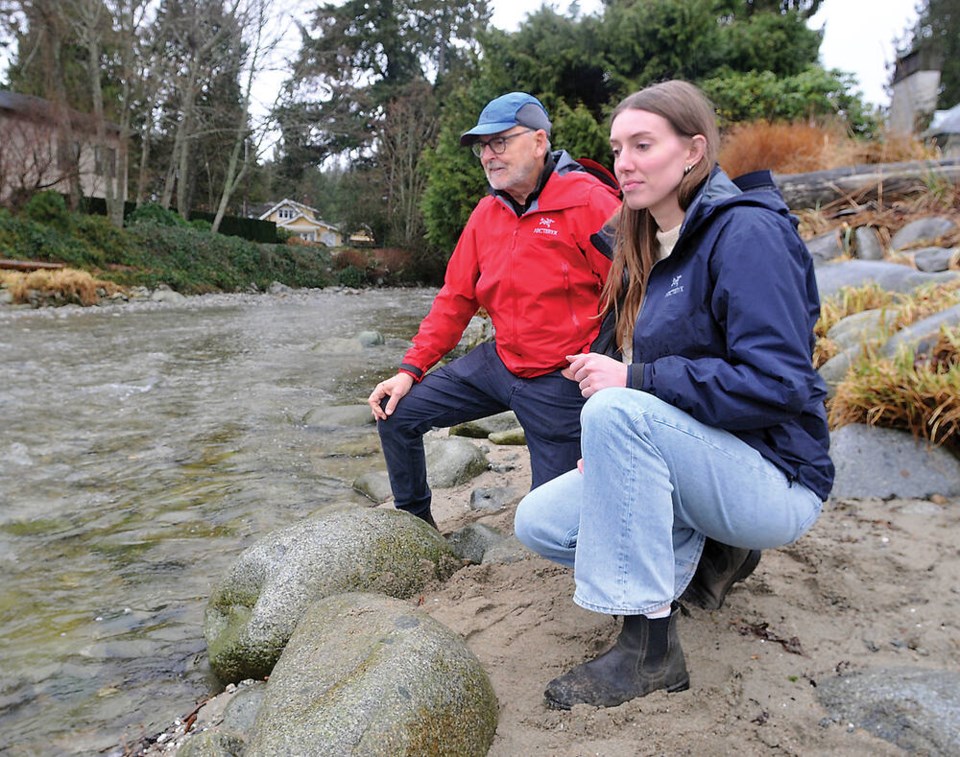The advice for B.C.’s salmon is same your cardiologist is giving you: Time to cut back on the sodium chloride.
A new study is showing the salt municipalities use to keep people safe on the roads in cold, wet weather is likely killing future generations of B.C. salmon.
It was the Stoney Creek Streamkeepers in Burnaby who first began monitoring for salt levels and noticed spikes coming in the wintertime. They raised the issue with scientists at UBC, SFU, BCIT and the federal Department of Fisheries and Oceans, all of which are now collaborating on a study that is quickly confirming that the substance we use to keep our roads safe can be lethal for salmonids.
For the last four years, local Streamkeepers groups have been logging data from 40 water quality monitoring stations on 30 Lower Mainland creeks, which capture everything from temperature to electrical conductivity, which is a proxy for salinity, every 10 minutes.
B.C.’s provincial guidelines state that fresh water should never have more than 600 milligrams of chloride per litre of water, but the data shows spikes much higher than that in the wintertime, lasting for about 24 hours at a time.
“We’re seeing peaks up to 10 times that, so 6,000 milligrams per litre,” Clare Kilgour, a UBC grad student working on the road salt project.
In a lab at UBC, scientists on the project recreated the conditions salmonids are likely to face in the creeks, exposing them at various stages of their life cycle to 600 to 4,800 milligrams of chloride per litre.
While recently hatched salmon showed some tolerance, freshly fertilized eggs are the most vulnerable.
“They’re not doing as well,” Kilgour said. “We’re closing in on 100 per cent mortality at those highest concentrations.”
Exactly why is still being studied, but Kilgour said it appears the salt interferes with the eggs’ ability to take on water, grow and form a hardened wall.
Bad timing
Most salmonids being studied spawn in the late fall, which is exceptionally bad luck for the fertilized eggs buried in the creeks’ gravel just as the cold weather arrives and municipalities begin deploying their fleets of salt trucks.
“November and December are probably the highest risk months for both coho and chum based on their spawning windows,” Kilgour said.
While the study continues, Kilgour said it’s not too early for municipalities, which are likely the largest source of salt going into the streams, to start looking for ways to mitigate the damage.
“I think a lot of people in B.C. understand the stressors that Pacific salmon are facing, and it’s a big, very multi-faceted issue,” she said. “And if this is one of those stressors that we could maybe take immediate action on, I think that would be wonderful.”
One of the top recommendations is to cut back the use of rock salt pellets and rely more on brine solutions to keep the roads safe.
“It uses about 50 per cent less salt and sticks to the road better so that would limit that contamination, and would maybe even be financially appealing,” she said.
Private citizens and property managers who salt their walks and driveways could probably also cut back. Two tablespoons per square meter for your driveway is plenty, scientists say.
That’s a message that municipalities should be pushing, said West Vancouver Streamkeepers volunteer Steve MacDonald.
“And yet you see places where there’s more salt than snow. It’s so thick. It’s just not necessary and that stuff, come the first rain, is ending up in our waterways,” he said.
And local governments can offer aquatic species a great deal of protection, MacDonald added, by supporting the installation of rain gardens or bioswales, which use rocks, soil and plants to filter runoff at key points where it enters the stormwater and creek system.
The West Vancouver Streamkeepers have been lobbying for more biofiltration infrastructure since an Oct. 2023 mass fish kill on Brothers Creek left dozens of coho dead. The most likely culprit was 6PPD-quinone, a chemical additive in car tires that accumulates on roadsides and then washes into creeks with stormwater. It is considered the second-most toxic chemical to coho, with as little as one millionth of a gram per litre of water likely to be fatal.
A UBC study, however, found that biofiltration systems can remove more than 90 per cent of the noxious chemicals before they reach the fish’s gills.
“But it applies to salt contamination as well,” Macdonald said. “Bioswales are just generally good for reducing the amount of toxins that are getting into waterways.”
MacDonald cited the road salt project as a shining example of citizen science in which volunteers can support academics and governments with field research, which can otherwise be laborious and expensive.
“You can’t manage what you don’t understand. Simple as that,” he said. “Municipalities just don’t have that horsepower, so Streamkeepers … can fill that in. They can be the eyes and ears.”
In a statement, District of West Vancouver spokesperson Carrie Gadsby said the municipality uses a 24-per cent brine solution “where possible and when the conditions are appropriate” – before and after freezing conditions set it. But once snow and ice are on the road surface, brine is no longer effective.
“The district continues to carry out ongoing work and initiatives with Streamkeepers related to the protection of fish, fish habitat and water quality throughout watersheds in West Vancouver,” she said. “Once additional data is available and we have a better idea of this issue as it relates to the creeks in West Vancouver, the district would explore this further with Streamkeepers.”
[email protected]
twitter.com/brentrichter
brentrichter.bsky.social




